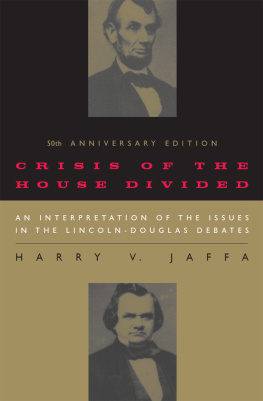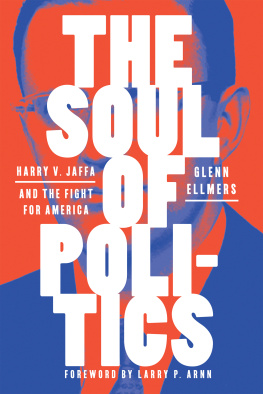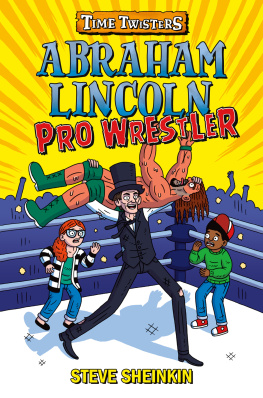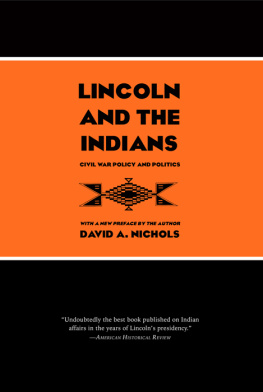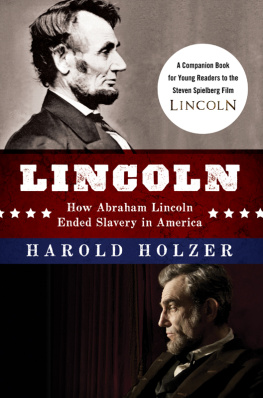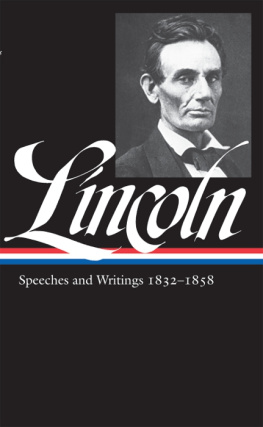About the Author
Harry V. Jaffa (19182015) was a Distinguished Fellow of the Claremont Institute, a professor of government at Claremont McKenna College and the Claremont Graduate School, and the author of numerous articles and books, including his widely acclaimed study of the Lincoln-Douglas debates, Crisis of the House Divided: An Interpretation of the Lincoln-Douglas Debates.
Appendix The Dividing Line between Federal and Local Authority: Popular Sovereignty in the TerritoriesA Commentary
As 1860 drew near, Stephen A. Douglas was without doubt the most popular Democrat in the free states. Yet as events were to prove, he was essentially a man without a party, because he represented a policy and a principle that were being ground into dust between the upper and the nether millstones of proslavery and antislavery. The disaster that struck at the Democratic convention in Charleston in April 1860, dividing the Democrats into two parties and dooming their nominees to defeat, was the ineluctable outcome of the antebellum debate, and in particular of the LincolnDouglas debates. Perhaps there has never in political history been a time when the logic of events followed so closely the logic of argument. In the last analysis, Douglas failed in deed because he failed in speech to justify his compromise position.
Lincoln, in his letter to Alexander Stephens of December 22, 1860, summed up the difference between North and South as follows: You think slavery is right, and ought to be extended; while we think it is wrong and ought to be restricted. In his inaugural address Lincoln would use almost identical words. If there was no middle ground between those who thought slavery right and those who thought it wrong, one side or the other would have to yield or the decision would be made by force.
At some point after his joint debates with Lincoln, Douglas came to the realization that Lincolns sustained critique of his version of popular sovereignty had made him vulnerable to the charge with which Lincoln would end his speech at Cooper Institute: Let us be diverted by none of those sophistical contrivances such as groping for some middle ground between the right and the wrong, vain as the search for a man who should be neither a living man nor a dead mansuch as a policy of dont care on a question about which all true men do care. Lincolns antislavery policy was supported by the doctrine of human equality in the Declaration of Independence. The proslavery policy was supported by the denial of the truth of the Declarations laws of nature and of natures God and the assertion that, by the genuine laws of God and nature, slavery was the best possible condition for Negroes. Douglas had to prove that there was a constitutionally principled reason why Congress ought to ignore the question of the rightness or wrongness of slavery, leaving the issue of slavery in the territories to the people of each territory alone. For Douglas, moral right consisted in having the people of each territory or state decide the question for themselves, rather than in what the people decided. Popular sovereignty was itself neutral as to the rightness or wrongness of slavery, and only a policy of such neutrality could avert secession and civil war.
Douglass Harpers essay, The Dividing Line between Federal and Local Authority: Popular Sovereignty in the Territories, was an attempt to provide a broad historical and philosophical foundation for this policy.
The Harpers essay expresses its thesis by subsuming the distinction between state and territory under the word local. According to Douglas, there was not any fundamental difference between a state and a territory with respect to the right to internal self-government. By drawing a distinction between the right of Congress (or of any lawful government) to confer powers and its right to exercise powers, he denied the relevance of the fact that a territorial government (unlike a state government) was a legal creation of Congress. Once powers were conferred, he argued, the sovereignty inherent in the exercise of such powers belonged to those upon whom they were conferred.
Congress may confer upon the judicial department all the judicial powers and functions of the Territory, without having the right to hear and determine a cause, or render a judgment, or to revise or annul any decision made by the courts so established by Congress. Congress may also confer upon the legislative department of the Territory certain legislative powers which it can not itself exercise.... The powers which Congress may thus confer but can not exercise, are such as relate to the domestic affairs and internal polity of the Territory, and do not affect the general welfare of the Republic.
According to Douglas, no matter what the legal instrumentalities by which the legislative power of a territory is called into existence, once it exists, it possesses the exclusive right of legislation with respect to its domestic polity, and any interference with that right is both legally and morally wrong. The only qualification he would admit would be that it is subject to the restrictions of the Constitution (e.g., no bills of attainder, ex post facto laws, patents of nobility, etc.).
What Douglass argument omits, however, is as important as what it includes. Here is the comment of President Buchanans attorney general, Jeremiah Black:
A Territorial government is merely provisional and temporary. It is created by Congress for the necessary preservation of order and the purposes of police. The powers conferred upon it are expressed in the organic act, which is the charter of its existence, and which may be changed and repealed at the pleasure of Congress. In most of those acts the power has been expressly reserved to Congress of revising the Territorial laws, and the power to repeal them exists without such reservation. This was asserted in the case of Kansas by the most distinguished Senators in Congress of 1856. The President appoints the Governor, judges, and all other officers whose appointment is not otherwise provided for, directly or indirectly, by Congress. Even the expenses of the Territorial government are paid out of the federal treasury. The truth is, they have no attribute of sovereignty about them.
However much Black and the Buchanan administration represented the proslavery persuasion on the territorial question, what Black says here was also Lincolns and the Republican Partys opinion concerning the dependent and contingent status of territorial governments. An organized territory was a state in statu nascendi. It was to the state it would become what the child is to the adult. The supervisory power of Congress corresponds to that of a parent before a child reaches the age of consent. Douglass task was somehow to prove, notwithstanding the foregoing, that there was an element of sovereignty in territorial majorities sufficient to justify what he called popular sovereignty.
Douglas attempted to ground this conception of sovereignty in the history of the American Revolution. He drew an exact parallel between the local authority of the colonies within the British Empire and the local authority of states and territories within the Constitution. And he characterized the entire Revolution as a defense of local against central authority.
[The American Colonists] conceded the right of the Imperial government to make all laws and perform all acts concerning the Colonies, which were in their nature Imperial and not Colonialwhich affected the general welfare of the Empire, and did not interfere with the internal polity of the Colonies.... [I]n general they recognized the right of the Imperial government of Great Britain to exercise all the powers and authority which, under our federal Constitution, are delegated by the people of the several states to the government of the United States.


